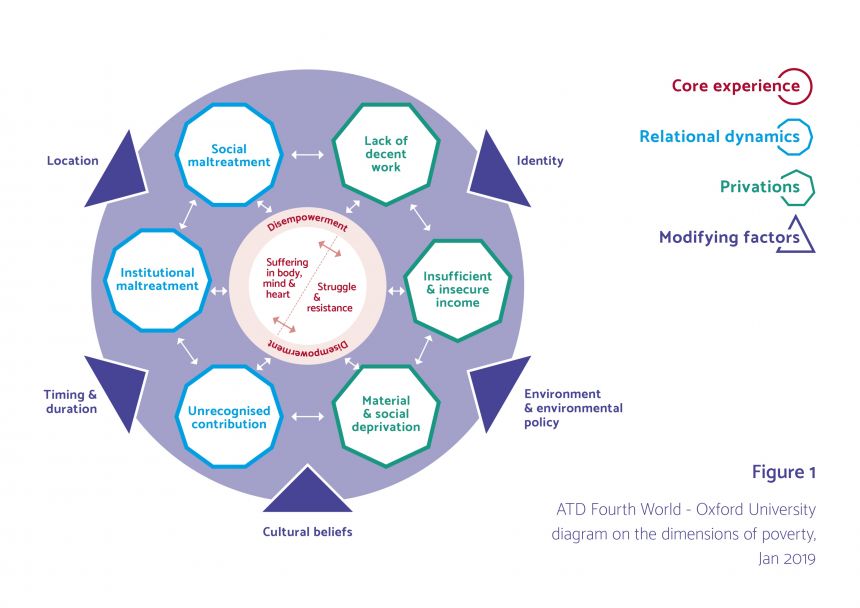Exposing the hidden dimensions of poverty
A new multidimensional model of poverty, developed by Oxford researchers and ATD Fourth World, is helping to define and address the hidden dimensions of poverty.
“Ending poverty in all its forms everywhere is the overarching goal of the United Nation’s 2030 Agenda for Sustainable Development,” says Dr Rachel Bray. “To achieve this, we need to have a better understanding of poverty and more meaningful ways to quantify it.”
“Most measures of poverty focus on income, and perhaps aspects of health, education or living standards, but we looked at evidence from around the world and wondered whether there are other dimensions. And we wanted to research this rigorously in equal partnership with people experiencing poverty.”
The partnership between Oxford researchers and ATD Fourth World, an international social movement of people with direct experience of poverty, supported a three-year study in six contrasting countries (Bangladesh, Bolivia, France, Tanzania, the UK and the US). The aim was to identify the dimensions of poverty in each and investigate whether there are dimensions common to all.
 Graph showing dimensions of poverty.
Graph showing dimensions of poverty. (Credit: ATD Fourth World & Oxford University)
The project adopted the ‘merging of knowledge’ approach, a participatory process developed by ATD Fourth World, in which people living in poverty, practitioners (e.g. social workers and educators), and academics become co-researchers. Its premise is that knowledge born from lived experience of poverty differs from that arising from either professional experience or studying poverty, and that all these contributions are equally valid.
Knowledge from each peer group was brought together in a series of meetings and a process of reflective analysis. Representatives from the three groups then met for several days to work with the concepts identified and build a collective understanding of poverty. This resulted in an agreed set of dimensions for each country. A similar ten-day process involving all six national research teams then developed an overarching international model.
The multi-dimensional model has ‘suffering in mind, body and heart’ and ‘struggle and resistance,’ at the core of the experience of poverty. Further dimensions reflecting the human, lived experience rarely considered in policy discussions include: ‘disempowerment’, ‘social and institutional maltreatment’, and ‘unrecognised contributions’. “Although daily life in each of the research countries is very different,” says Bray, “we found that people experience poverty in very similar ways.”
“We were particularly struck by the depth of feeling around ‘unrecognised contributions’. Participants from every country concluded that people living in poverty are not acknowledged for the work they do, the support they provide to families and communities, or their care for the environment. Wider society just chooses not to see it.”
“Whilst mainstream poverty measures may look at physical and even mental health,” continues Bray, “participants in this study emphasised the emotional toll of constant poverty, and the stigma and poor treatment it brings. They referred to the constant struggle to cope… to just get by… and to keep hope for the future.”
The model has now been published in an accessible report The Hidden Dimensions of Poverty, an academic paper, and a book chapter, and has caught the attention of agenda-setting national and international organisations.
The Organisation for Economic Cooperation and Development (OECD) hosted a one-day conference in May 2019 to launch the research findings and discuss their implications for policy. Team members from Oxford and ATD Fourth World were invited to present at the UN Sustainable Development High Level Political Forum in New York in July 2019; and the World Bank and IMF plan a day to learn from the wider team in early 2021. Each national research team has also hosted in-country events to discuss findings. Moving forward, work to develop indicators for the new dimensions is being widely discussed with pre-piloting work well-advanced in China.
“The Hidden Dimensions of Poverty project has been truly innovative,” Bray confirms. “Many researchers consult with affected groups, but this deeply participative process involves people experiencing poverty in every stage of the research, including analysis, drawing conclusions, and taking the findings forward. The result is a major contribution to making less-recognised aspects of poverty visible to policy makers – an essential step on the road to ending all forms of poverty by 2030.”
Dr Rachel Bray is Associate Member of the Department of Social Policy and Intervention, and Strategy Lead / Careers Adviser for Research Students and Staff with the University of Oxford Careers Service
Funders: John Fell Fund, IAA Knowledge Exchange Fellowship, AFD (French Department of International Development), ATD Fourth World.